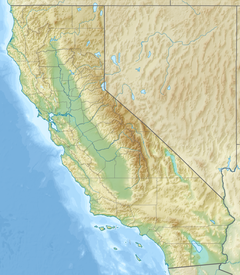Oakland Bay Bridge
| San Francisco–Oakland Bay Bridge | |
|---|---|

The western section of the San Francisco-Oakland Bay Bridge
|
|
| Coordinates | 37°49′5″N 122°20′48″W / 37.81806°N 122.34667°WCoordinates: 37°49′5″N 122°20′48″W / 37.81806°N 122.34667°W |
| Carries | 10 lanes of |
| Crosses |
San Francisco Bay via YBI |
| Locale | San Francisco and Oakland |
| Owner | State of California |
| Maintained by | California Department of Transportation and the Bay Area Toll Authority |
| ID number |
|
| Characteristics | |
| Design | Double-decked suspension spans (two, connected by center anchorage), tunnel, cast-in-place concrete transition span, self-anchored suspension span, precast segmental concrete viaduct |
| Material | Steel, concrete |
| Total length | West: 10,304 ft (3,141 m) East span: 10,176 ft (3,102 m) Total: 4.46 miles (7.18 km) excluding approaches |
| Width | West: 5 traffic lanes totaling 57.5 ft (17.5 m) East: 10 traffic lanes totaling 258.33 ft (78.74 m) |
| Height | West: 526 ft (160 m) |
| Longest span | West: two main spans 2,310 ft (704 m) East: one main span 1,400 ft (430 m) |
| Clearance above | Westbound: 14 feet (4.3 m), with additional clearance in some lanes Eastbound: 14.67 feet (4.47 m) |
| Clearance below | West: 220 feet (67 m) East: 191 feet (58 m) |
| History | |
| Designer | Charles H. Purcell |
| Construction start | July 8, 1933 |
| Opened | November 12, 1936 |
| Statistics | |
| Daily traffic | 260,000 |
| Toll | Cars (east span, westbound only) $6.00 (rush hours) $2.50 (carpool rush hours) $4.00 (weekday non-rush hours) $5.00 (weekend all day) |
| Designated | August 13, 2001 |
| Reference no. | 00000525 |
The San Francisco–Oakland Bay Bridge (known locally as the Bay Bridge) is a complex of bridges spanning San Francisco Bay in California. As part of Interstate 80 and the direct road between San Francisco and Oakland, it carries about 260,000 vehicles a day on its two decks. It has one of the longest spans in the United States.
The toll bridge was conceived as early as the gold rush days, but construction did not begin until 1933. Designed by Charles H. Purcell, and built by American Bridge Company, it opened on November 12, 1936, six months before the Golden Gate Bridge. It originally carried automobile traffic on its upper deck, and trucks and interurban streetcars on the lower, but after the Key System abandoned rail service, the lower deck was converted to all-road traffic as well. In 1986 the bridge was unofficially dedicated to James Rolph.
The bridge has two sections of roughly equal length; the older western section, officially known as the Willie L. Brown Jr. Bridge (after former San Francisco Mayor and California State Assembly Speaker Willie L. Brown Jr.), connects downtown San Francisco to Yerba Buena Island; and the newer unnamed eastern section connects the island to Oakland. The western section is a double suspension bridge with two decks, westbound traffic being carried on the upper deck while eastbound is carried on the lower one. The largest span of the original eastern section was a cantilever bridge. During the 1989 Loma Prieta earthquake, a portion of the eastern section's upper deck collapsed onto the lower deck and the bridge was closed for a month. Reconstruction of the eastern section of the bridge as a causeway connected to a self-anchored suspension bridge began in 2002; the new eastern section opened September 2, 2013, at a reported cost of over $6.5 billion, a 2,500% cost overrun from the original estimate of $250M. Unlike the western section and the original eastern section of the bridge, the new eastern section is a single deck with the eastbound and westbound lanes on each side making it the world's widest bridge, according to Guinness World Records, as of 2014. Demolition of the old east span is expected to last until 2018.
...
Wikipedia

